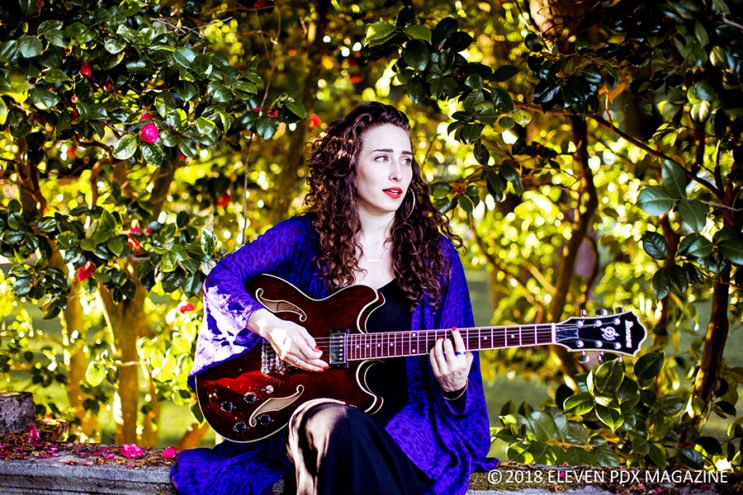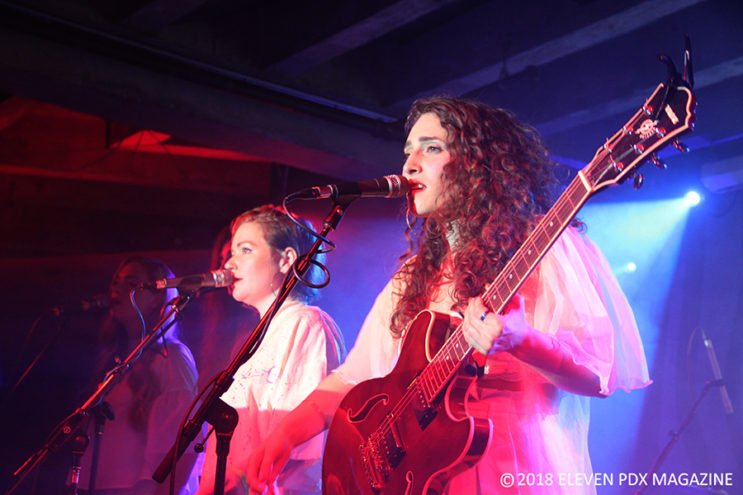Moorea Masa & The Mood


Moorea Masa, Portland’s prodigal daughter of soul, strolls down the path, guitar under her arm. Usually I’ll meet artists for interviews in their favorite dim dive bars, or in practice spaces or basements cluttered with cables and gear and the weird accoutrements that seem to collect in places where people do creative work. Not so with Moorea. She’s asked if we’d meet her at Peninsula Park in North Portland, one of her favorite spots, she says, and rightfully so. It’s a stunning mid-May afternoon, one of the first days of real heat, and the people are out in force.
It’s a fitting space to discuss Moorea’s new album, Shine A Light, which she describes as an attempt to examine the darker parts of herself, to illuminate the pain and to watch it shrivel in the light of a healing sun. We sit on the steps by the park’s central gazebo, surrounded by the happy sounds of life, and we talk.
ELEVEN:So you just got done teaching, where was that? Have you been doing that for a while?
Moorea Masa: At the Falcon Arts building, and yeah, I’ve been teaching voice for about six years now, and I do voice workshops and stuff.
11:Most people who do that say they also learn things from teaching…
MM: Oh yeah, I love teaching. I first started to make some side money, with doing music, and now I love it, it’s a good balance for me, sometimes I can’t always teach because I’m busy, but I have a good balance between teaching and being on the road. Sometimes being a musician can be a very self-absorbed job in a lot of ways, not the actual performing and making music part, but all the other sides can be really, like, just telling people how great you are, you know? So yeah, teaching is a really great balance to that, holding space for other people, which I love, and helping people make music, which is really amazing and important.
11: You’re a native Portlander, but you left for a while to travel. What made you decide to return? Was there a moment, or a kind of general feeling?
MM: Yeah, I mean I lived in England, I went to school there for a couple years, and I dropped out and moved to Spain and lived in a cave in Spain for a while. That’s a whole ‘nother interview. (laughs) Yeah, but I hitchhiked around Europe for a while. I decided to quit school for a number of reasons, but part of moving back here was leaving Portland and realizing that not everywhere has the same community as we do here. I grew up playing music in the Portland scene since I was maybe fifteen, and it was such a supportive environment. Everybody works together and goes and sees each other’s shows, and it’s not like that everywhere. When I left, I was like, oh my gosh, Portland is a really special place.

11: I’ve been here going on nine years, and a lot has changed, and probably even more so since when you were growing up. Some of that change is maybe not for the better, but it’s all happening regardless. Do you think that’s affected that sense of community, that you’ve noticed?
MM: Oh my god, yeah. In both negative and positive ways. In positive ways as a musician, there’s definitely more opportunities. The city has a bigger scene, so you can be more recognized, you can build a name for yourself in Portland more than maybe you used to be able to. But it’s also more saturated. And I mean, I live on Alberta, and my sister used to live on Killingsworth and like fourteenth, and that area used to be so dangerous growing up. It was not like it is now. So in some ways it’s nice that it’s not as dangerous, but also people are getting pushed out of their homes, mostly black communities. I mean, there’s an eighteen unit complex going in right where there used to be one home. It’s just ridiculous.
11: So, the new record is just out. How does that feel, how has it been received?
MM: Yeah! It’s still really new, so I think people are just starting to get to hear it, but I think it’s been received really well.
11: How did you arrive at this collection of songs?
MM: Well yeah, I’ve been working on this record for a few years. The record is called Shine A Light, and the theme has been me just really taking a look at myself, looking at myself in the mirror, and I’ve said this a couple times in interviews, but I feel like our country has been doing that as a whole lately, and I’ve been taking a hard look at myself, and digging deeper into those things that I didn’t want to look at earlier. I think that’s what we’re doing as a whole right now.
11: I think “Wake Up/Lover Be Found” seems to be the most pointedly political, and it seems to kind of have this transition from the personal to the political. For me, R&B and Soul always come from a very personal place, songs about love and loss, but then it can be used as a vehicle for social commentary…
MM: Yeah, I mean there’s a huge history of R&B being political. But “Wake Up/Lover Be Found” is about police and gun violence, and Lauren Steele (Lo Steele) does a really beautiful spoken word piece on that song, and I got a couple of my friends to just wail at the end, it was a really moving moment in the studio, recording these women, we were all just in tears, thinking about a woman losing her son to gun violence.
11: Do you feel like as an artist it’s your duty to give a voice to these issues, to maybe start that conversation?
MM: Oh sure. You watch the news and you think, what the hell am I doing with my life? Should I be out there doing something? And I’m not going to be a lawyer or something, that’s not how my brain works, but as a musician, whether it’s in my songwriting or when I’m performing, or on my social media, or whatever it is, whenever I can use my platform, I think I have a duty to speak out.
11: Shine A Light was produced by Jeremy Most, how did you make that connection?
MM: I didn’t really know him before, I’d just been a huge fan of his work. And there’s also some Portland people who worked on the record, Raymond Richards and Sebastian Rogers also worked on the record, but yeah Jeremy was there from the beginning to the very end. He produced Emily King’s last couple records, I’m a huge fan of hers, and I found out about him through her, and did a few opening shows for her, and met him through that. We had a bunch of mutual friends, and one of them was like, “reach out to him,” and I was like “there’s no way he’d want to work with me,” but he got back to me the same day, like, “send me your tunes, I like your stuff.”
11: The production is really clean, and vocal-centric, and seems to re-create what you might sound like in a live setting. Was that a style that you had in mind?
MM: Yeah, I mean I tried to make it more produced than I have in the past. But it’s funny because my perception is that it’s very produced, but I’ve had a lot of people say that it feels really live and stripped down, and I’m like, gosh, there’s so many instruments and all that.
11: Can you speak a little about the video for “I Can’t Tell?”
MM: Yeah, that video I made with my best friend ever in the whole world, she just started a production company called Ursa Major, out of the bay area, and she and her husband came up and we did the video along with some really incredible dancers in portland, Akela Jaffi choreographed the whole thing, and it had Che Che Luna, Marquise Dickerson, and Grace Eucker, Uriah Boyd, and Paige Moreland, just really amazing humans. Daniel Giron was in it, he was the male lead. Yeah, so that was a really special experience putting that together.
11: I also wanted to talk a bit about the collaboration with Ural Thomas, who you used to sing with. How did that come to be? Did you write the song together?
MM: Yeah, I just missed singing with Ural, so I asked if he would be on the record. I wrote the song, and asked if he would come sing it with me. He’s one of my favorite people on the whole planet.
11: So you’re about to set off on this west coast tour with Raquel Rodriguez, how did that come together? Did you know her previously?
MM: No, I’ve been a fan of hers, and kinda connected through some mutual friends, and we were just both fangirling on each other, and were like, wouldn’t it be fun if we toured together, and then realized that we actually could, so we’re doing it.
11: What do you have going on after the tour?
MM: A bunch of festivals this summer, although I don’t know that all of those are announced. Upstream Music Fest is announced, that’s on June 2nd. [I’m playing] festivals this summer, then I’m touring with K.D. Lang in the fall, and I’m going to do a fall Europe tour, then hopefully some music videos, and them some new music will come eventually, once I can sleep a little bit.




